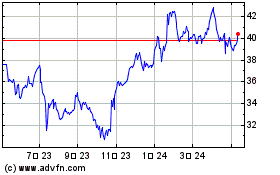By Drew FitzGerald and Allison Prang
T-Mobile US Inc. said in 2019 that its merger with wireless
rival Sprint Corp. would be "jobs-positive from Day One."
More than a year into that marriage, the combined company has
fewer people working for it than before.
T-Mobile's big spending on next-generation wireless technology
has yet to show up in its head count, which dropped over the past
year despite thousands of new job openings. The cellphone carrier
reported 75,000 full-time and part-time equivalent workers at the
end of last year, roughly 5,000 fewer than it had when it closed
its merger with Sprint.
Chief Executive Mike Sievert said the coronavirus pandemic,
coupled with a faster-than-expected combination with its erstwhile
rival, restrained its head count. But he said the company has 6,000
open positions it expects to fill as the economy rebounds.
"We've moved from a phase in 2020 where we were focused on
combining the two companies, and that causes us to look for some
efficiencies, to where the results of those efficiencies turn out
to be growth," Mr. Sievert said in an interview. "Now we're hiring
and hiring as rapidly as we can."
T-Mobile recently decided to shut down TVision, the television
channel bundle it launched in November. A company spokesman said
all employees in that division will be offered positions in other
parts of the company, though employees who want to work in the TV
industry will need to find jobs elsewhere.
Critics say the layoffs show T-Mobile's promise of job growth
from a combination with a close competitor were unrealistic. The
companies in 2019 said their pending merger would spur more
hiring.
Mr. Sievert said the Bellevue, Wash., company still has more
workers than T-Mobile and Sprint would have employed had their
merger deal collapsed.
T-Mobile isn't the only telecom company with a diminished
workforce. AT&T Inc. had about 16,000 fewer employees at the
end of 2020 compared with the prior year, according to securities
filings. The decline reflected changes at WarnerMedia, which
eliminated thousands of positions, as well as cuts in wireless
retail jobs.
Filings show Verizon Communications Inc. employed about 3,000
fewer people by the end of 2020. Another 10,000 employees are
expected to fall off its rolls later this year after the company
sells a majority stake in Verizon Media, owner of such brands like
AOL and Yahoo, to private-equity firm Apollo Global Management Inc.
for $5 billion.
The telecommunications sector employed about 690,000 people at
the end of April, according to preliminary seasonally adjusted data
from the U.S. Labor Department. That is down from 699,000 workers a
year earlier. Overall employment in the sector has steadily
declined from a peak of nearly 1.5 million in 2001.
Government statistics don't tell the whole story of a telecom
industry that has outsourced many jobs. Contractors who retrofit
cell towers sometimes appear in official figures as construction
workers, for instance.
"All the places where you would expect to see growth may have
been farmed out," said Michael Mandel, chief economist for the
Progressive Policy Institute, a center-left think tank. "It used to
be the person that came into your house to install the phone was
with the phone company. Now the person who sells you the cellphone
might not work for the phone company."
Verizon Chief Executive Hans Vestberg said in an interview last
week that his company's shrinking employee base doesn't reflect all
the people working on company projects, including outside
contractors hired to install new cellular tower equipment and drape
fiber-optic cables to new locations.
"From that point of view, we are employing more people than
ever," he said.
AT&T in February agreed to sell a 30% stake in its DirecTV
satellite unit to TPG, another private-equity firm, for $1.8
billion. The Dallas company said the move will transfer about 1,100
employees to a new business outside of its previous owner's
control.
Many job cuts throughout the industry targeted cellphone shops
forced to close or run on limited schedules during the early months
of the coronavirus crisis. Wireless executives have said the
pandemic helped speed existing plans to trim their retail base and
reach more subscribers online.
Verizon, the country's largest cellphone carrier by subscribers,
has closed some stores and thinned the ranks of retail managers who
oversee store-level workers. The company reported about $515
million of severance liabilities in an April securities filing.
Jeff Moore, the chief of telecom industry advisory Wave7
Research, said some stores were expected to close after Sprint and
T-Mobile merged. The two brands, which had roughly 8,800 stores in
early 2020, were down to about 7,500 locations this year.
"You'd have, in some cases, stores that were literally within a
stone's throw of each other," Mr. Moore said. "For Starbucks, it
may make sense. In wireless, it does not."
Kyeisha Jones worked for Sprint for three years in the company's
Overland Park, Kan., headquarters, before the company laid her off
in April 2020, the same month T-Mobile's merger closed. As a lead
development representative, Ms. Jones's team of around five
provided leads for the company to make presentations to
businesses.
"They kept telling us that we were not going to be laid off,"
said Ms. Jones, who is 35 years old. Then she had a work call where
her team members thought they were going to meet their new
department head. They were told they were being let go.
"None of us saw it coming," she said.
Write to Drew FitzGerald at andrew.fitzgerald@wsj.com and
Allison Prang at allison.prang@wsj.com
(END) Dow Jones Newswires
May 10, 2021 05:44 ET (09:44 GMT)
Copyright (c) 2021 Dow Jones & Company, Inc.
Verizon Communications (NYSE:VZ)
過去 株価チャート
から 3 2024 まで 4 2024

Verizon Communications (NYSE:VZ)
過去 株価チャート
から 4 2023 まで 4 2024
